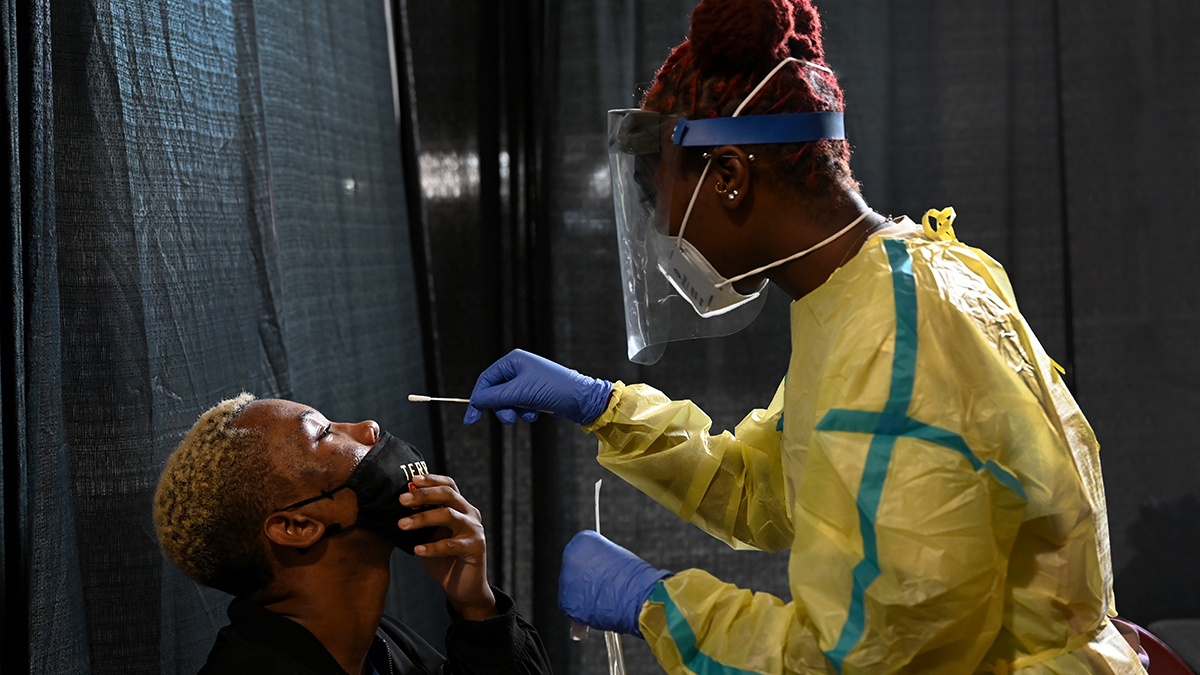As the number of COVID-19 cases rises, President Donald Trump is blaming states for the delays in getting vaccines distributed around the country.
Currently, only about 2 million people have been vaccinated across the U.S. — far short from the 20 million promised by the end of the year.
West Virginia leads the country in vaccinations per capita, with Colorado close behind. West Virginia has received over 103,000 doses and administered 39,035.
That’s 2,178 vaccine doses administered per 100,000 residents.
For every 100,000 residents, D.C. has vaccinated 1,611; Virginia 737 and Maryland 583, according to Centers for Disease Control and Prevention data.
Health experts point to problems with the Trump administration's plan putting states in control.
Maryland Gov. Larry Hogan told CBS that the federal government offered “no financial support and no real plan” for administering the vaccines.
Each of Maryland’s 23 counties is creating its own blueprint for distribution of doses. For the most part, hospitals, nursing homes and health offices already slammed due to the pandemic were put in charge of figuring out how to administer vaccines.
“While we’re trying to roll out vaccinations, we’re also continuing the pandemic response by supporting testing, contact tracing, disease control and all of those other aspects of the COVID response,” Montgomery County Health Officer Travis Gayles told the New York Times.
Other factors include lower vaccine allotments than initially planned and slower production, Hogan said.
“It’s not just sticking needles in arms. There’s a lot of moving parts,” Hogan said. “Nobody is quite performing at the top capacity and we’ve got to work to ramp it up.”
Virginia expects to receive about 100,000 more vaccine doses by the end of this week, but even with this new shipment, the Commonwealth is still falling behind its original vaccination target.
The state health department says about 20% of its COVID-19 vaccines have been administered so far.
Still, one staff member involved in giving vaccinations in Fairfax County urged people to keep these numbers in perspective.
“We typically see vaccine development take years and the fact that we have a vaccine that we are administering here at the end of 2020 is really a testament to the scientists and logisticians who brought us here,” he said.
What the Data Shows
Virginia has reached a new peak in the number of residents hospitalized with COVID-19, hitting 2,388. Another 3,714 residents were diagnosed with the virus, which is a record-high number.
The holiday week may be impacting reporting, however. The seven-day rolling average of new cases is lower than it was one week ago.
Maryland counted 2,973 new cases on Thursday, which is higher than average. Hospitalizations have ticked upward this week, reaching 1,773 on Thursday.
D.C. diagnosed 225 more coronavirus cases on Thursday and reported 234 hospitalizations.
Local Coronavirus Headlines
- Virginia reported another record day for new coronavirus infections, and that surge is putting even more pressure on hospitals in the commonwealth already pushed to the brink.
- Among the industries hit hardest by the pandemic has been performance venues like theaters and nightclubs, but help is on the way after President Donald Trump signed the new relief bill.
- New figures from the Virginia Department of Corrections show that two inmates and one staff member who tested positive for the coronavirus have died in recent days.
- The high level of coronavirus cases is putting stress on Northern Virginia hospitals — and the health care professionals who work there.
- The stress of the pandemic is a grind. A data analysis from the American Dental Association shows a surge in cases of teeth grinding, clenching and cracking during the COVID-19 crisis. The increases are striking and potentially costly and painful for sufferers.
- A professor is using the trust Black Americans have in barbers to make them more comfortable with taking the COVID-19 vaccine.
- A rapid antigen test might seem like a great idea when you're in a hurry and don't have time to wait a few days for results, but those tests are really designed for people with COVID-19 symptoms and in asymptomatic patients can deliver false positive results.
- Help is available for thousands of D.C. residents who have fallen behind on rent payments.
- Maryland Gov. Larry Hogan announced measures to boost the number of available health care workers and plan for more hospital beds.
- COVID-19 numbers continue to paint a dire picture for Black Americans, and there is an ongoing effort in the Black community to increase testing.
Reopening Tracker
- A judge upheld Montgomery County, Maryland's ban on indoor dining.
- D.C. has suspended indoor dining until 5 a.m. on Jan. 15, Mayor Muriel Bowser said in a press release.
- Virginia instituted a curfew and a stricter mask mandate.
- Maryland tightened restrictions on businesses, bars and restaurants.
- All Smithsonian museums and the National Zoo closed because of rising COVID-19 cases, officials announced.
- Hours before some Fairfax County students were set to return to in-person learning, the school district said that they needed to delay the plan.
- Courts throughout Maryland partially shut down due to the pandemic.
- Virginia announced new measures to fight COVID-19 as cases of the virus have spiked across the country.
- Prince George's County tightened restrictions and required masks to be worn outdoors.
- Montgomery County reduced capacity limits at many businesses, including for indoor dining, to 25%.
- D.C.'s mayor extended the city's coronavirus state of emergency to last through the end of the year.
How to Stay Safe
Anyone can get COVID-19. Here are three simple ways the CDC says you can lower your risk:
- Wear a snug-fitting mask that covers your nose and mouth.
- Avoid being indoors with people who are not members of your household. The more people you are in contact with, the more likely you are to be exposed to COVID-19. If you are indoors with people you don’t live with, stay at least six feet apart and keep your mask on.
- Wash your hands often, especially after you have been in a public place.



